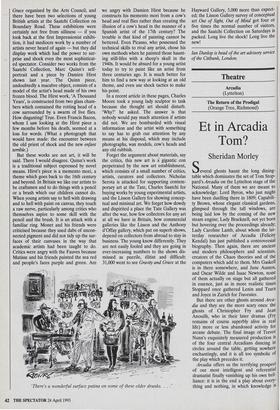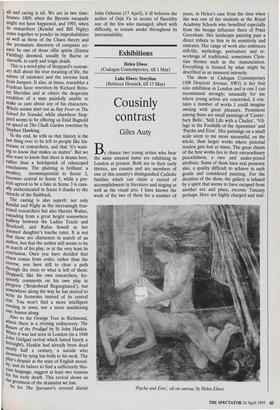Theatre
Arcadia (Lyttelton) The Return of the Prodigal (Orange Tree, Richmond)
Et in Arcadia Tom?
Sheridan Morley
Several ghosts haunt the long dining- table which dominates the set of Tom Stop- pard's Arcadia on the Lyttelton stage of the National. Many of them we are meant to acknowledge: Lord Byron, who just might have been duelling there in 1809; Capabili- ty Brown, whose elegant classical gardens, glimpsed through the tall windows, are being laid low by the coming of the new steam engine; Lady Bracknell, not yet born but hovering over the proceedings already; Lady Caroline Lamb, about whom the lat- terday researcher of Arcadia (Felicity Kendal) has just published a controversial biography. Then again, there are ancient and modern philosophers and scientists, creators of the Chaos theories and of the computers which add to them. Mrs Gaskell is in there somewhere, and Jane Austen, and Oscar Wilde and Isaac Newton, none of them actually on stage but all gathered in essence, just as in more realistic times Stoppard once gathered Lenin and Tzara and Joyce in Zurich for Travesties.
But there are other ghosts around Arca- dia and they are the more scary ones: the ghosts of Christopher Fry and Jean Anouilh, who in their later dramas (Fry remains of course superbly alive in real life) more or less abandoned activity for arcane debate. The final image of Trevor Nunn's exquisitely measured production is of the four central Arcadians dancing in circles around the table, getting nowhere enchantingly, and it is all too symbolic of the play which precedes it. Arcadia offers us the terrifying prospect of our most intelligent and referential dramatist finally vanishing up his own bril- liance: it is in the end a play about every- thing and nothing, in which knowledge is all and caring is nil. We are in two time- frames: 1809, when the Byronic escapade might not have happened, and 1993, when its researchers (Kendal and Bill Nighy) come together to ponder its improbabilities as well as those of the Chaos theory and the premature discovery of computer sci- ence by one of those elfin spirits (Emma Fielding) doomed, usually by Barrie or Anouilh, to early and tragic death.
This is a word-play of Stoppard's custom- ary skill about the true meaning of life, the nature of existence and the tortoise back from Jumpers. It also, at times, resembles a Feydeau farce rewritten by Richard Brins- ley Sheridan and at others the desperate erudition of a man painfully unable to make us care about any of his characters. Whole scenes start out as Hay Fever or The School for Scandal, while elsewhere Stop- pard seems to be offering us Enid Bagnold on speed or The Chalk Garden rewritten by Stephen Hawking.
In the end, he tells us that history is the last thing ever to be left to people like his- torians or researchers, and that 'it's want- ing to know that makes us matter'. But we also want to know that there is drama here, rather than a hotchpotch of telescoped conclusions. The planting is brilliant: a monkey, inconsequential to Scene 2, becomes central to Scene 5, while a por- trait agreed to be a fake in Scene 3 is casu- ally authenticated in Scene 6 thanks to the Miracle of the flashback.
The casting is also superb: not only Kendal and Nighy as the increasingly frus- trated researchers but also Harriet Walter, cascading from a great height somewhere halfway between the Ladies Teazle and Bracknell, and Rufus Sewell as her doomed daughter's louche tutor. It is not that these are characters in search of an author, but that the author still seems to be m search of his play, or at the very least its conclusion. Once you have decided that chaos comes from order, rather than the reverse, you have still to clear a path through the trees or what is left of them: StoPPard, like his own researchers, fre- quently comments on his own play in progress (`Brideshead Regurgitated'), but somewhere along the way he has started to write its footnotes instead of its central text. You won't find a more intelligent evening in town, nor a more maddening mie: hasten along. Also to the Orange Tree in Richmond, Where there is a riveting rediscovery: The ILeturri of the Prodigal by St John Hankin. When it was last seen in London (in a 1948 !Win Gielgud revival which lasted barely a fortnight), Hankin had already been dead nearly half a century, a suicide who drowned by tying bar-bells to his neck. The Play's despair at the state of English moral- ity, and its failure to find a sufficiently Sha- y', an language, suggest at least two reasons r his early death. This revival shows us the greatness of the dramatist we lost. As for The Spectator's revered diarist John Osborne (17 April), it ill behoves the author of Di jd Vu to accuse of flaccidity one of the few who managed, albeit with difficulty, to remain awake throughout its interminability.



























































 Previous page
Previous page